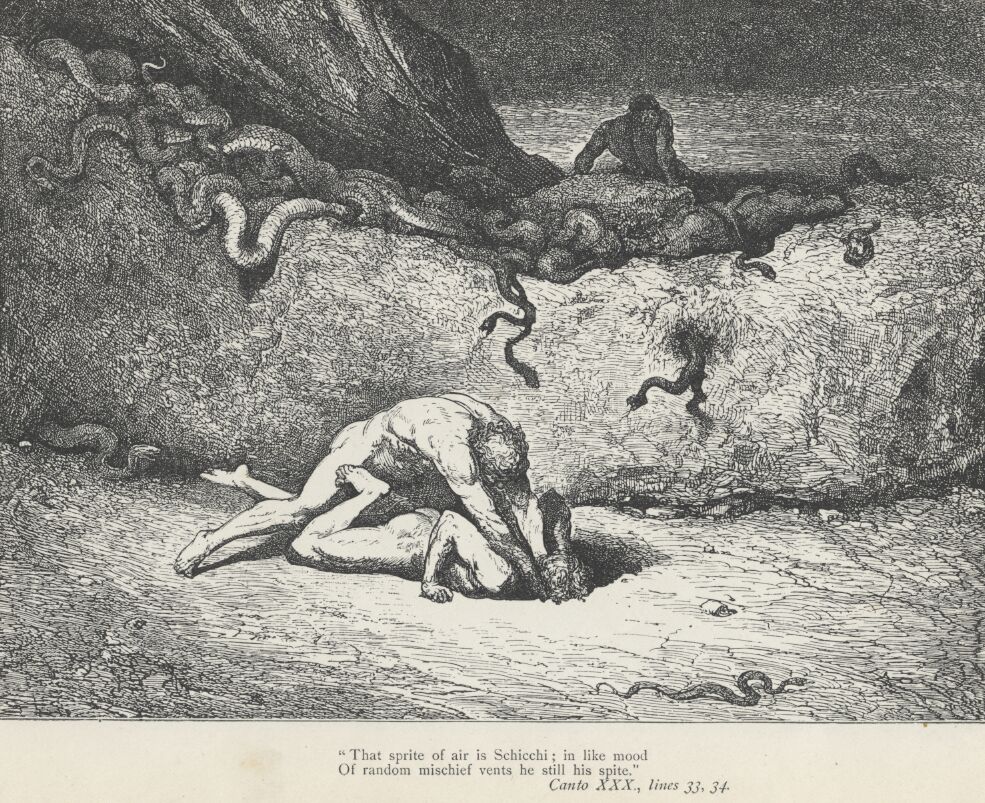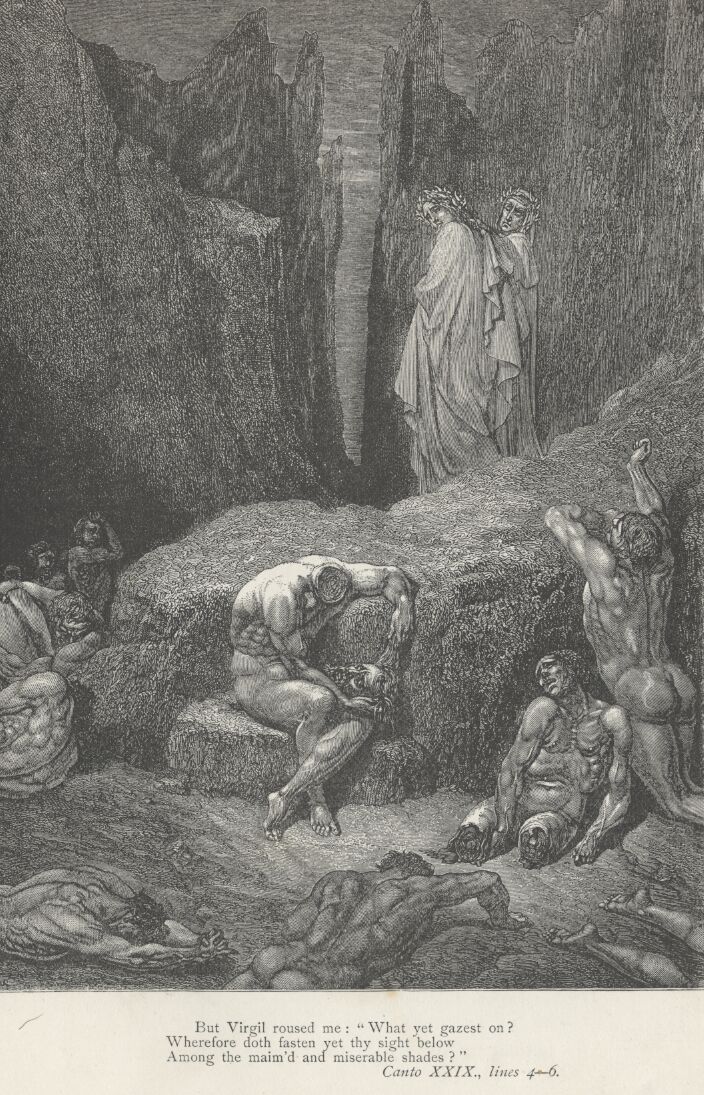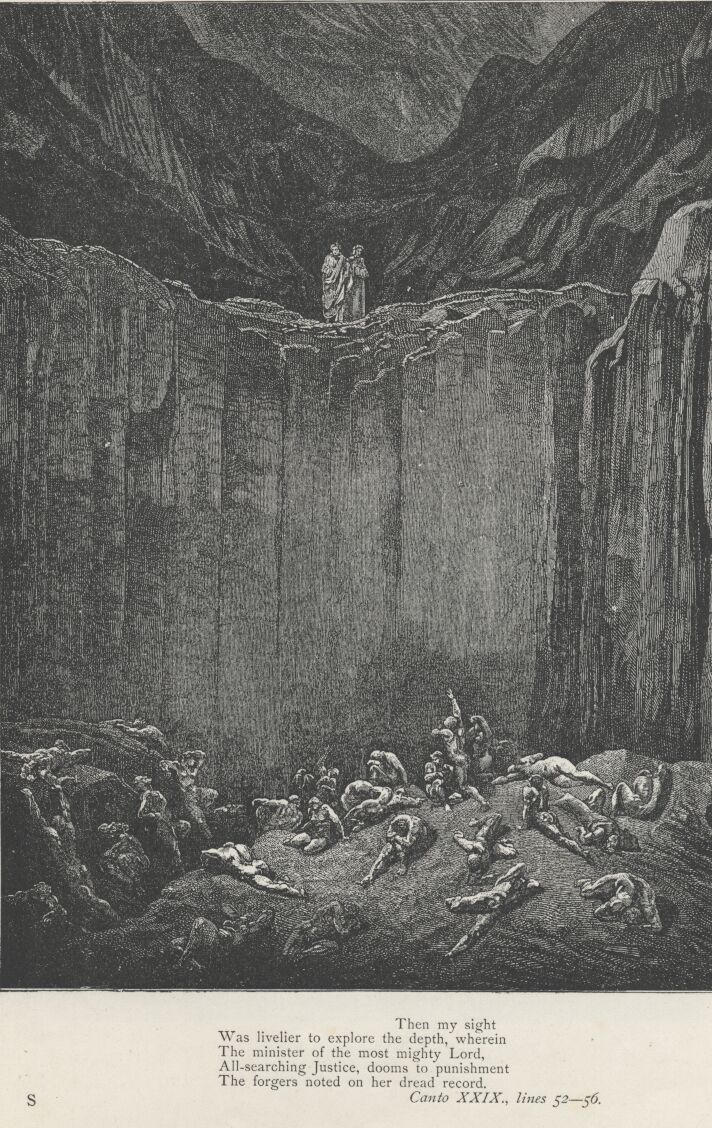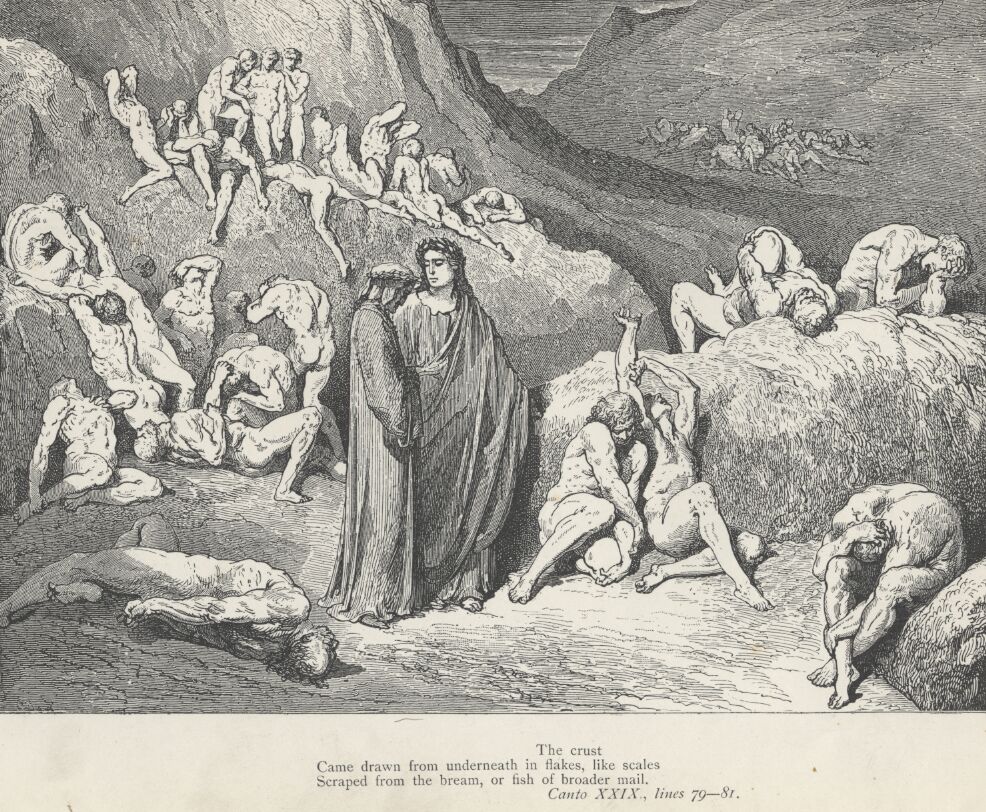‘Twas at the time when Juno was enraged,
For Semele, against the Theban blood,
As she already more than once had shown,
So reft of reason Athamas became,
That, seeing his own wife with children twain
Walking encumbered upon either hand,
He cried: “Spread out the nets, that I may take
The lioness and her whelps upon the passage;”
And then extended his unpitying claws,
Seizing the first, who had the name Learchus,
And whirled him round, and dashed him on a rock;
And she, with the other burthen, drowned herself;–
And at the time when fortune downward hurled
The Trojan’s arrogance, that all things dared,
So that the king was with his kingdom crushed,
Hecuba sad, disconsolate, and captive,
When lifeless she beheld Polyxena,
And of her Polydorus on the shore
Of ocean was the dolorous one aware,
Out of her senses like a dog she barked,
So much the anguish had her mind distorted;
But not of Thebes the furies nor the Trojan
Were ever seen in any one so cruel
In goading beasts, and much more human members,
As I beheld two shadows pale and naked,
Who, biting, in the manner ran along
That a boar does, when from the sty turned loose.
One to Capocchio came, and by the nape
Seized with its teeth his neck, so that in dragging
It made his belly grate the solid bottom.
And the Aretine, who trembling had remained,
Said to me: “That mad sprite is Gianni Schicchi,
And raving goes thus harrying other people.”
“O,” said I to him, “so may not the other
Set teeth on thee, let it not weary thee
To tell us who it is, ere it dart hence.”
And he to me: “That is the ancient ghost
Of the nefarious Myrrha, who became
Beyond all rightful love her father’s lover.
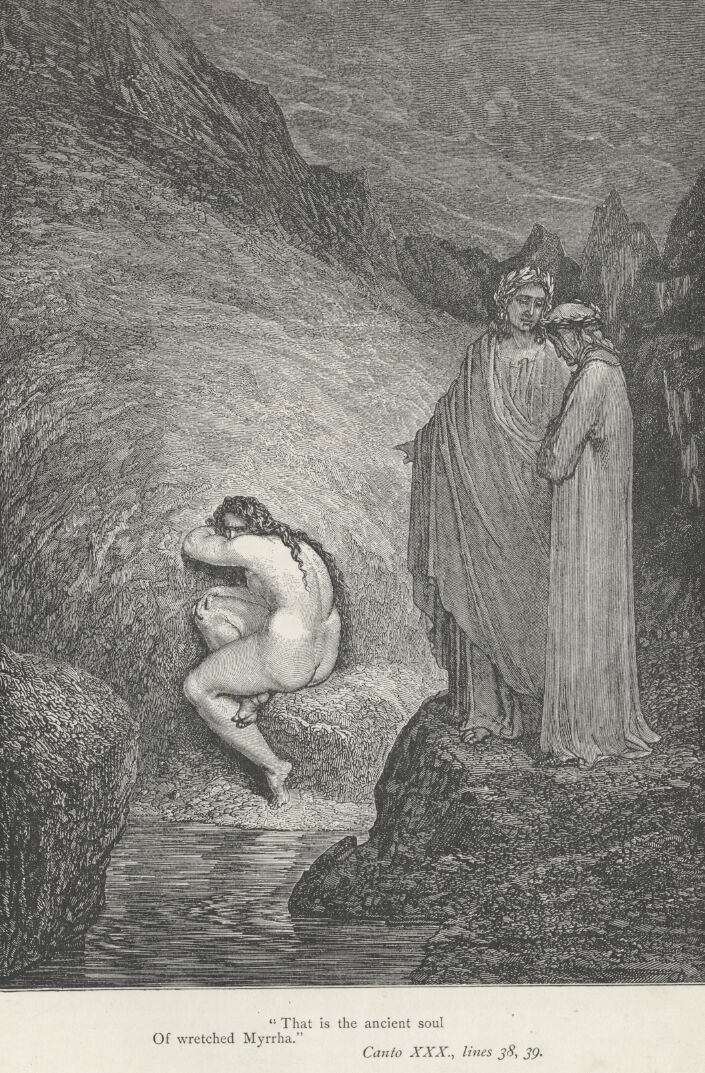
“That is the ancient ghost / Of the nefarious Myrrha, who became / Beyond all rightful love her father’s lover.
She came to sin with him after this manner,
By counterfeiting of another’s form;
As he who goeth yonder undertook,
That he might gain the lady of the herd,
To counterfeit in himself Buoso Donati,
Making a will and giving it due form.”
And after the two maniacs had passed
On whom I held mine eye, I turned it back
To look upon the other evil-born.
I saw one made in fashion of a lute,
If he had only had the groin cut off
Just at the point at which a man is forked.
The heavy dropsy, that so disproportions
The limbs with humours, which it ill concocts,
That the face corresponds not to the belly,
Compelled him so to hold his lips apart
As does the hectic, who because of thirst
One tow’rds the chin, the other upward turns.
“O ye, who without any torment are,
And why I know not, in the world of woe,”
He said to us, “behold, and be attentive
Unto the misery of Master Adam;
I had while living much of what I wished,
And now, alas! a drop of water crave.
The rivulets, that from the verdant hills
Of Cassentin descend down into Arno,
Making their channels to be cold and moist,
Ever before me stand, and not in vain;
For far more doth their image dry me up
Than the disease which strips my face of flesh.
The rigid justice that chastises me
Draweth occasion from the place in which
I sinned, to put the more my sighs in flight.
There is Romena, where I counterfeited
The currency imprinted with the Baptist,
For which I left my body burned above.
But if I here could see the tristful soul
Of Guido, or Alessandro, or their brother,
For Branda’s fount I would not give the sight.
One is within already, if the raving
Shades that are going round about speak truth;
But what avails it me, whose limbs are tied?
If I were only still so light, that in
A hundred years I could advance one inch,
I had already started on the way,
Seeking him out among this squalid folk,
Although the circuit be eleven miles,
And be not less than half a mile across.
For them am I in such a family;
They did induce me into coining florins,
Which had three carats of impurity.”
And I to him: “Who are the two poor wretches
That smoke like unto a wet hand in winter,
Lying there close upon thy right-hand confines?”
“I found them here,” replied he, “when I rained
Into this chasm, and since they have not turned,
Nor do I think they will for evermore.
One the false woman is who accused Joseph,
The other the false Sinon, Greek of Troy;
From acute fever they send forth such reek.”
And one of them, who felt himself annoyed
At being, peradventure, named so darkly,
Smote with the fist upon his hardened paunch.
It gave a sound, as if it were a drum;
And Master Adam smote him in the face,
With arm that did not seem to be less hard,
Saying to him: “Although be taken from me
All motion, for my limbs that heavy are,
I have an arm unfettered for such need.”
Whereat he answer made: “When thou didst go
Unto the fire, thou hadst it not so ready:
But hadst it so and more when thou wast coining.”
The dropsical: “Thou sayest true in that;
But thou wast not so true a witness there,
Where thou wast questioned of the truth at Troy.”
“If I spake false, thou falsifiedst the coin,”
Said Sinon; “and for one fault I am here,
And thou for more than any other demon.”
“Remember, perjurer, about the horse,”
He made reply who had the swollen belly,
“And rueful be it thee the whole world knows it.”
“Rueful to thee the thirst be wherewith cracks
Thy tongue,” the Greek said, “and the putrid water
That hedges so thy paunch before thine eyes.”
Then the false-coiner: “So is gaping wide
Thy mouth for speaking evil, as ’tis wont;
Because if I have thirst, and humour stuff me
Thou hast the burning and the head that aches,
And to lick up the mirror of Narcissus
Thou wouldst not want words many to invite thee.”
In listening to them was I wholly fixed,
When said the Master to me: “Now just look,
For little wants it that I quarrel with thee.”
When him I heard in anger speak to me,
I turned me round towards him with such shame
That still it eddies through my memory.
And as he is who dreams of his own harm,
Who dreaming wishes it may be a dream,
So that he craves what is, as if it were not;
Such I became, not having power to speak,
For to excuse myself I wished, and still
Excused myself, and did not think I did it.
“Less shame doth wash away a greater fault,”
The Master said, “than this of thine has been;
Therefore thyself disburden of all sadness,
And make account that I am aye beside thee,
If e’er it come to pass that fortune bring thee
Where there are people in a like dispute;
For a base wish it is to wish to hear it.”
